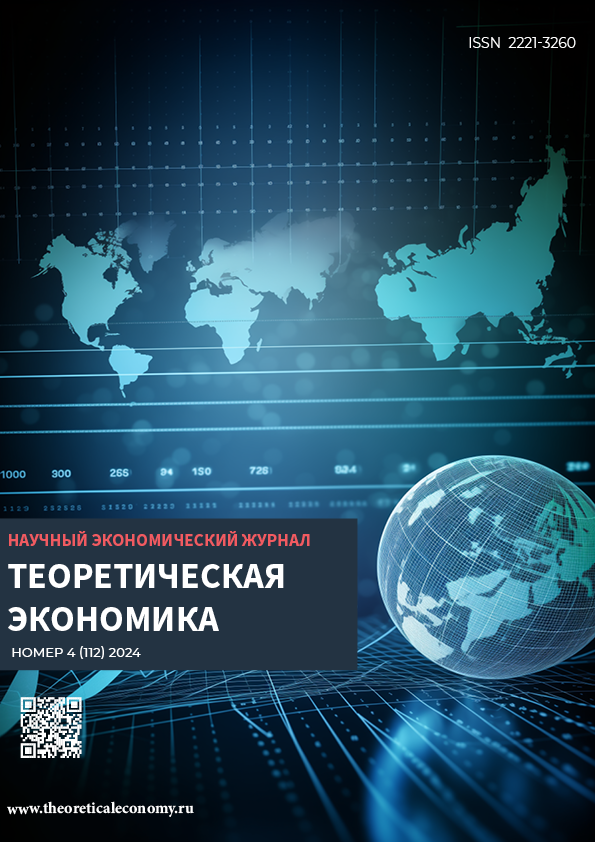Volgograd, Volgograd, Russian Federation
Economic theory applies a set of methods that form a methodological program. The purpose of the article is to study the variety of types of methodologies in modern economic theory. The objectives of the research are aimed at: studying the origins of each methodological program in the process of its use by economists; identifying the effectiveness of types of economic methodology; determining the priority directions of economic and methodological research in the conditions of information society. The following types of methodological programs in economic theory are analyzed: postpositivist, analytical, neopragmatic, historical, dialectical, pluralistic, eclectic, synergetic, postmodernist, game, relativistic. It is shown that in modern conditions it is difficult to talk about a linear approach to the methods of scientific research. As a consequence, it is impossible to identify a single methodological program that would suit all scientists. Along with the mainstream, heterodox economics is actively developing, which unites a number of scientific schools and opposes to economics. The rapid change of scientific paradigms indicates the transition from classical to post-classical economics, which indicates not only quantitative but also qualitative transformations in science. At present, the eclectic approach, which is also a type of methodology, is more prevalent among economic scientists. At the same time, postpositivist and analytical methodology, associated with the mainstream, is in demand, especially in English-speaking countries. Apparently, in the conditions of the technological revolution currently underway, new methodological programs aimed at the theoretical understanding of such phenomenon as artificial intelligence will be formed. This is where we can expect the greatest number of methodological innovations. All this is already reflected in economics. Thus economic methodology will also reach a new level of development.
methodological program, economic theory, postpositivist methodology, analytical methodology, neopragmatic methodology, historical methodology, dialectical methodology, heterodox economics, eclectic methodology, relativistic methodology
1. Bekker G.S. Chelovecheskoe povedenie: ekonomicheskiy podhod. Izbrannye trudy po ekonomicheskoy teorii / G.S.Bekkr. – M.: GU VShE, 2003. – 672 s.
2. B'yukenen Dzh.M. Sochineniya / Dzh.M.B'yukenen. – T. 1. – M.: Taurus Al'fa, 1997. – 556 s.
3. Uerta de Soto H. Social'no-ekonomicheskaya teoriya dinamicheskoy effektivnosti / H.Uerta de Soto. – Chelyabinsk: Socium, 2011. – 409 s.
4. Blaug M. Metodologiya ekonomicheskoy nauki, ili Kak ekonomisty ob'yasnyayut / M.Blaug. – M.: NP «Zhurnal Voprosy ekonomiki», 2004. – 416 s. EDN: https://elibrary.ru/QQEPPX
5. Robbins L. Predmet ekonomicheskoy nauki // Thesis. Teoriya i istoriya ekonomicheskih i social'nyh sistem i institutov. – M.: NAChALA-PRESS, 1993. – Vyp. 2. – S. 10-23.
6. Fridmen M. Kapitalizm i svoboda / M.Fridmen. – M.: Novoe izdatel'stvo, 2006. – 240 s.
7. Fridmen M. Metodologiya pozitivnoy ekonomicheskoy nauki / M.Fridmen // Thesis. Teoriya i istoriya ekonomicheskih i social'nyh sistem i institutov. – M. NAChALA-PRESS, 1994. – Vyp. 5. – S. 20-52.
8. Shmoller G. Spravedlivost' v narodnom hozyaystve. Razdelenie truda / G.Shmoller. – M.: Knizhnyy dom «LIBROKOM», 2012. – 224 s.
9. Veber M. Izbrannye proizvedeniya / M.Veber. – M.: Progress, 1990. – 808 s. EDN: https://elibrary.ru/SGUYOR
10. Buzgalin A.V. Global'nyy kapital: V 2-h tt. T.1. Metodologiya: po tu storonu pozitivizma, postmodernizma i ekonomicheskogo imperializma / A.V.Buzgalin, A.I.Kolganov. – M.: LENAND, 2015. – 640 s.
11. Mal'cev A.A. Geterodoksal'naya ekonomicheskaya teoriya: tekuschee sostoyanie i puti dal'neyshego razvitiya / A.A.Mal'cev // Ekonomicheskaya politika. – 2018. – T. 13. – № 2. – S. 148-169. DOI: https://doi.org/10.18288/1994-5124-2018-2-08; EDN: https://elibrary.ru/URSVRG
12. Samuel'son L. Princip maksimizacii v ekonomicheskom analize / L.Samuel'son // Thesis. Teoriya i istoriya ekonomicheskih i social'nyh sistem i institutov. – M. NAChALA-PRESS, 1993. – Vyp. 1. – S. 184-201.
13. Nort D. Instituty, institucional'nye izmeneniya i funkcionirovanie ekonomiki / D.Nort. – M.: Fond ekonomicheskoy knigi «Nachalo», 1997. – 180 s. EDN: https://elibrary.ru/YQDVYE
14. Kozlovski P. Principy eticheskoy ekonomiki / P.Kozlovski. – SPb.: Ekonomicheskaya shkola, 1999. – 344 s.
15. Marshall A. Principy ekonomicheskoy nauki / A.Marshall. – T.1. – M.: Izd. gruppa «Progress»: «Univers», 1993. – 415 s.
16. Keyns Dzh.M. Obschaya teoriya zanyatosti, procenta i deneg / Dzh.M.Keyns. – M.: ZAO «Bizneskom», 2013. – 408 s.
17. Stigler Dzh. Ekonomicheskaya teoriya informacii / Dzh.Stigler // Teoriya firmy. – SPb.: Ekonomicheskaya shkola, 1995. – S. 507-529.
18. Kleyner G.B. K metodologii modelirovaniya prinyatiya resheniy ekonomicheskimi agentami / G.B.Kleyner // Ekonomika i matematicheskie metody. – 2003. – № 2. – S. 167-182. EDN: https://elibrary.ru/OOLIPH
19. Zang V.-B. Sinergeticheskaya ekonomika. Vremya i peremeny v nelineynoy ekonomicheskoy teorii / V.-B.Zang. – M.: Mir, 1999. – 335 s.
20. Bodriyyar Zh. Simvolicheskiy obmen i smert' / Zh.Bodriyyar. – M.: «Dobrosvet», 2000. – 387 s. EDN: https://elibrary.ru/FVFYSF
21. Derrida Zh. O grammatologii / Zh.Derrida. – M.: Ad Marginam. – 2000. – 512 s. EDN: https://elibrary.ru/SMWHKZ
22. Saymon G.A. Teoriya prinyatiya resheniy v ekonomicheskoy nauke i nauke o povedenii / G.A.Saymon // Teoriya firmy. – SPb.: Ekonomicheskaya shkola, 1995. – S. 54-72.
23. Geraschenko I.G. Pedagogicheskoe tvorchestvo: metodologicheskiy i sociokul'turnyy podhod / I.G.Geraschenko, N.V.Geraschenko // Innovacii v obrazovanii. – 2016. – № 10. – S. 120-128. EDN: https://elibrary.ru/WMWOVN
24. Heyzinga Y. Homo ludens. V teni zavtrashnego dnya / Y.Heyzinga. – M.: Izdatel'skaya gruppa «Progress», «Progress-Akademiya», 1992. – 464 s.
25. Neyman Dzh. fon. Teoriya igr i ekonomicheskoe povedenie / Dzh. fon Neyman, O.Margenshtern. – M.: Nauka, 1970. – 983 s.
26. Hausman D. Ekonomicheskaya metodologiya v dvuh slovah / D.Hausman // Mirovaya ekonomika i mezhdunarodnye otnosheniya. – 1994. – № 2. – S. 105-113.
27. Ol'sevich Yu. K relyativistskoy ekonomicheskoy teorii / Yu.Ol'sevich // Voprosy ekonomiki. – 1995. – № 6. – S. 4-14.
28. Nayt F. Ponyatie riska i neopredelennosti / F.Nayt // Thesis. Teoriya i istoriya ekonomicheskih i social'nyh sistem i institutov. – M.: NAChALA-PRESS, 1994. – Vyp. 5. – S. 12-28.
 This work is licensed under Creative Commons Attribution-NonCommercial-NoDerivatives 4.0 International
This work is licensed under Creative Commons Attribution-NonCommercial-NoDerivatives 4.0 International


















